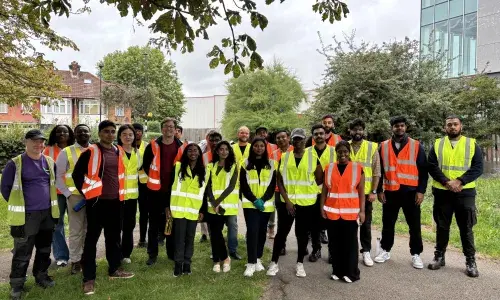
Diversity must underpin the net zero energy workforce
To mark International Day of Women and Girls in Science, our Chief Engineer David Wright explains why getting more women into STEM is vital to build the net zero energy workforce that will help create a greener, cleaner energy system for the future.
'A diverse workforce in a supportive environment drives success – through different perspectives, new ideas and greater creativity – all of which contribute to more effective problem solving.' This is a quote from our Building the Net Zero Energy Workforce report, which we published in January. These words are especially pertinent today, on the United Nations’ International Day of Women and Girls in Science.

As part of its sustainable development goals, the UN is highlighting the need for gender equality; recognising that, as well as being a fundamental human right, it’s also a necessary foundation for a ‘prosperous and sustainable world’. This is because it’s only through diversity of thought and skills that can we continue to be successful, while also tackling issues such as climate change and equality of opportunities.
At National Grid, we play a pivotal role in helping to decarbonise the energy system, to enable the UK to reach its target of becoming a net zero economy by 2050. But, for our industry to make such a transformational change, we need people. Our research reveals that we need to fill 400,000 jobs in the energy sector between now and 2050, to bring in the skills required to reach net zero. We can’t do this by simply pulling from the traditional talent pool – we must cast the net wider.
More women in the energy sector
One challenge our research brought into sharp focus was the under-representation of women in the energy sector. Women currently account for just 12% of the engineering workforce and the problem starts long before the recruitment stage. At every stage beyond GCSEs we are losing young women – they make up just 22% of A level physics students, just 8% of STEM apprentices and just 15% of engineering and technology graduates.
International Day of Women and Girls in Science gives us the opportunity to pause and consider what we can do to redress the balance in our sector. At National Grid, we have championed many initiatives to try to encourage young women to choose STEM subjects and consider engineering as a career, and to foster the professional development of the women who do work for us.
I sponsor an internal programme called 50/50 Women in Engineering, which is designed to increase the female engineering population. We also have an award that recognises our outstanding female talent, called the Female Engineer of the Year, and we run schemes to help break down the barriers to professional progression for our women engineers. In recognition of our efforts, we are one of the Times Top 50 Employers for Women.
Diversity is the key to tackling climate change
While things are improving and around a quarter of our workforce is female – 37.5% of the graduates who join us are women and 35% of our senior roles are held by women – we know that we need to keep promoting diversity throughout our business. Not just because it’s the right thing to do, but because we need more people to join us to help us overcome the challenge climate change poses to our business, our sector, our country and our world.
We know that women are motivated to help find the solutions that will help us deliver greener, cleaner energy; as our research shows that 83% of women say it’s important to play a role in the UK’s journey to net zero and over half of the people (57%) surveyed said they want to work in a business that is helping us get there.
There’s never been a more exciting time to join the energy sector, as the rapid pace of change opens up new opportunities in areas such as electric vehicle, hydrogen and carbon capture technology. Tackling climate changes requires a diverse workforce made up of people from different backgrounds, representing all genders, with new skills and existing expertise to help us build a net zero energy workforce to do the job that can’t wait.



